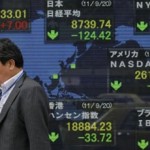Asian Stocks Sink to Four-Week Low as Yen Gains; Aussie Slides

-
Australian bonds surge as RBA cuts inflation forecast
-
Oil near $44, poised for first weekly decline in a month
Asian stocks dropped, set for the biggest weekly loss since February, and the yen rose before key American jobs data that will help shape the U.S. interest-rate outlook. Australia’s currency slumped and its bonds surged after the nation’s central bank lowered its inflation forecast.
Shanghai shares slid the most in two weeks, while Japan’s retreated as trading resumed after a three-day break. The yen gained against all 31 major peers. The Bloomberg Dollar Spot Index was headed for its biggest weekly advance in six months, buoyed by comments from Federal Reserve officials that a June rate hike is possible. U.S. crude oil was set for its first weekly drop in a month and industrial metals were poised for their biggest weekly loss since 2013. Australia’s three-year bond yield fell to a record.

A retreat in global stocks has gathered pace in the first week of May as data highlighted the fragile state of the world economy. The Reserve Bank of Australia joins the European Union in trimming inflation projections this week, after the Bank of Japan on April 28 pushed back the target date for meeting its 2 percent goal for consumer-price gains. Economists predict U.S. non-farm payrolls rose by 200,000 last month, a Bloomberg survey showed before Friday’s report.
“With the U.S. jobs report coming up, investors are holding back,” said Masahiro Ichikawa, a senior strategist at Sumitomo Mitsui Asset Management Co. in Tokyo. “They’re watching the yen very closely.”
Four regional Fed presidents said Thursday they were open to considering an interest-rate increase in June, something that’s been almost ruled out by derivatives traders. Fed Funds futures put the odds of a hike next month at around 10 percent, down from 20 percent a month ago.
Stocks
The MSCI Asia Pacific Index dropped 0.7 percent as of 1:42 p.m. Tokyo time, set for a weekly decline of 3.5 percent and its lowest close since April 8. The Shanghai Composite Index slid 1.7 percent, while Japan’s Topix index fell 0.6 percent from Monday’s close. Financial markets in Indonesia, South Korea and Thailand were shut for holidays.
“It’s not as bad as it could have been with Japan coming back and that’s been helped by a bit of weakening in the yen during the past couple of days,” said Angus Nicholson, a market analyst at IG Ltd. in Melbourne. “If we see a strong non-farm payrolls number tonight it will help the dollar move in the right direction and help Japanese equities.”
Sharp Corp. plunged as much as 11 percent after the Nikkei newspaper reported the struggling display-maker will post a net loss of 300 billion yen ($2.8 billion) for the year through March. Takata Corp. tumbled as much as 15 percent after the U.S. widened recalls of the company’s faulty airbags. A Tokyo-listed exchange-traded fund that tracks Brazil’s benchmark shares index fell 3 percent after Fitch Ratings downgraded its assessment of the country.
Futures on the S&P 500 declined 0.1 percent, while contracts on the U.K.’s FTSE 100 Index were little changed. ArcelorMittal, the world’s largest steelmaker, reported earnings that were in line with analysts’ estimates and Berkshire Hathaway Inc. is among other companies releasing quarterly results on Friday.
Currencies
The yen rose 0.2 percent to 107.08 per dollar, trimming its weekly loss to 0.5 percent. The currency jumped 5 percent last week, prompting policy makers to warn of possible intervention, as the Bank of Japan unexpectedly refrained from adding to record stimulus at a policy review. Prime Minister Shinzo Abe said Thursday he was ready to respond to excessive currency moves if needed.
“We expect BOJ to do a U-turn in the coming months by opting for more easing and this is likely to result in renewed yen depreciation,” said Salman Ahmed, the London-based chief global strategist at Lombard Odier Investment Managers, which oversees about $165 billion. “However, we are sometime away from this dynamic to take hold.”
The Aussie dropped as much as 1.1 percent to a two-month low and was poised for its biggest weekly loss since January. Australia’s central bank said underlying inflation is expected to be 1 to 2 percent 2016, down from the 2 to 3 percent it forecast in February. The authority cut its benchmark interest rate to a record low on Tuesday.
The Bloomberg Dollar Spot Index was little changed Friday, following a three-day climb that has sent it up 1.4 percent this week. The yuan was set for a 0.4 percent weekly loss versus the greenback before China on Sunday releases April figures for trade and foreign-exchange reserves.
Commodities
Copper plunged more than 5 percent this week in London, on track for its steepest weekly decline since January last year. Concern that demand from China, the world’s biggest user of industrial metals, is waning has slammed prices this week, with the London Metals Exchange metals index down 4.5 percent, the most since February 2013.
Steel reinforcement-bar futures dropped as much as 1.2 percent on the Shanghai Futures Exchange, contributing to a record 11 percent slide for the week. Iron ore and coking coal also retreated this week in China after authorities clamped down on speculators.
West Texas Intermediate crude dropped 1.1 percent to $43.83 a barrel. WTI has retreated 4.6 percent over the past five days, after rallying in all but one of the previous 12 weeks.
“Oil fundamentals are improving but the market is still apprehensive,” said Ehsan Ul-Haq, a senior consultant at KBC Advanced Technologies in London. “Only when refiners start complaining about the lack of supply will we see a sustainable recovery.”
Bonds
Australia’s three-year bonds surged, pushing their yield down by as much as 14 basis points to an unprecedented 1.55 percent. The yield on 10-year U.S. Treasuries held at 1.75 percent, the lowest in more than three weeks.
“There is still very strong pressure for deflation globally,” said Kei Katayama, a bond manager in Tokyo at Daiwa SB Investments, which has $50.3 billion in assets. “If the Fed tightens, people believe the pace will be very, very limited.”
Source: Bloomberg




























